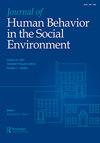城市筒仓:低收入居民的社区和社会资本及其对反贫困倡议的影响
IF 1.2
Q3 SOCIAL WORK
Journal of Human Behavior in the Social Environment
Pub Date : 2023-09-13
DOI:10.1080/10911359.2023.2254343
引用次数: 0
摘要
生活在贫困或接近贫困的境地对个人及其家庭来说可能是孤立的。我们从生态的角度考察了城市低收入人群的社会和社区资本,强调了跨系统的交易,以了解他们的一些选择所塑造和塑造的更广泛的地形,并提出了我们的研究结果可能对反贫困倡议的影响。数据来自对参加联邦政府资助的劳动力发展培训的181名城市居民的采访,这是一种特殊类型的社会支持计划,旨在增加参与者的人力资本,使他们能够在劳动力市场上更有效地竞争。调查结果表明,受访者的网络规模小,同质化,生活在资源枯竭的社区,社会支持来源有限。我们将其定义为陷入“城市孤岛”,其中与资源更健壮的系统的事务很少甚至不存在。虽然人力资本的发展至关重要,但由于存在这些孤岛,它可能不足以使个人及其家庭摆脱贫困。职业培训和其他反贫困举措需要有意地帮助参与者建立网络,以便他们能够更好地获得提供就业和其他经济和社会资源的机会途径。本文章由计算机程序翻译,如有差异,请以英文原文为准。
Urban silos: Community and social capital of low-income residents and the implications for anti-poverty initiatives
Living at or near poverty can be isolating for individuals and their families. Using the ecological perspective with emphasis on transactions across systems, we examine the social and community capital of urban, low-income individuals to understand the broader terrain that shapes and is shaped by some of their choices, and suggest the implications that our findings might have for anti-poverty initiatives. Data are from interviews with 181 urban residents involved in a federally funded workforce development training, a particular type of social support programming that endeavors to increase the human capital of participants so that they can compete more effectively in the labor market. Findings indicate that respondents have small, homogenous networks, live in resource depleted communities, and have limited sources of social support. We frame this as being caught in “urban silos,” in which transactions to more resource-robust systems are minimal to non-existent. While the development of one’s human capital is essential, because of these silos, it may not be sufficient for moving an individual and their family out of poverty. Job training, and other anti-poverty initiatives, need to intentionally assist participants in network building so they can better access opportunity pathways that provide jobs and other economic and social resources.
求助全文
通过发布文献求助,成功后即可免费获取论文全文。
去求助
来源期刊

Journal of Human Behavior in the Social Environment
SOCIAL WORK-
CiteScore
3.70
自引率
0.00%
发文量
61
期刊介绍:
The Journal of Human Behavior in the Social Environment helps social workers firmly grasp developing issues in human behavior theories. It provides an outlet for empirically based articles about human behavior theory that facilitate social workers" practice goals. This innovative journal is the first to address the complexities of human behavior in relation to social work and its relevancy to practice. This makes it an essential resource for classes in human behavior in the social environment. Articles provide you with groundbreaking, up-to-date information on developments in empirically based human behavior theory. They address conceptual and empirical foci which study human behavior as a complex phenomenon.
 求助内容:
求助内容: 应助结果提醒方式:
应助结果提醒方式:


